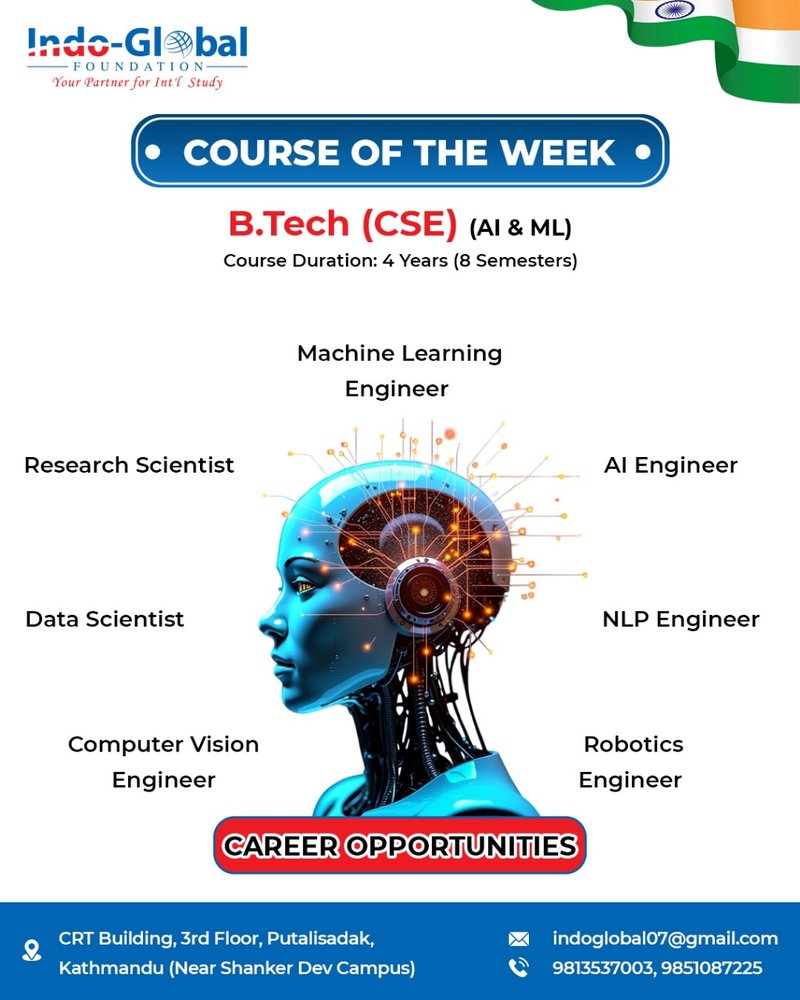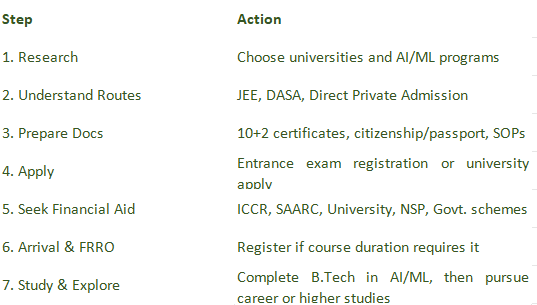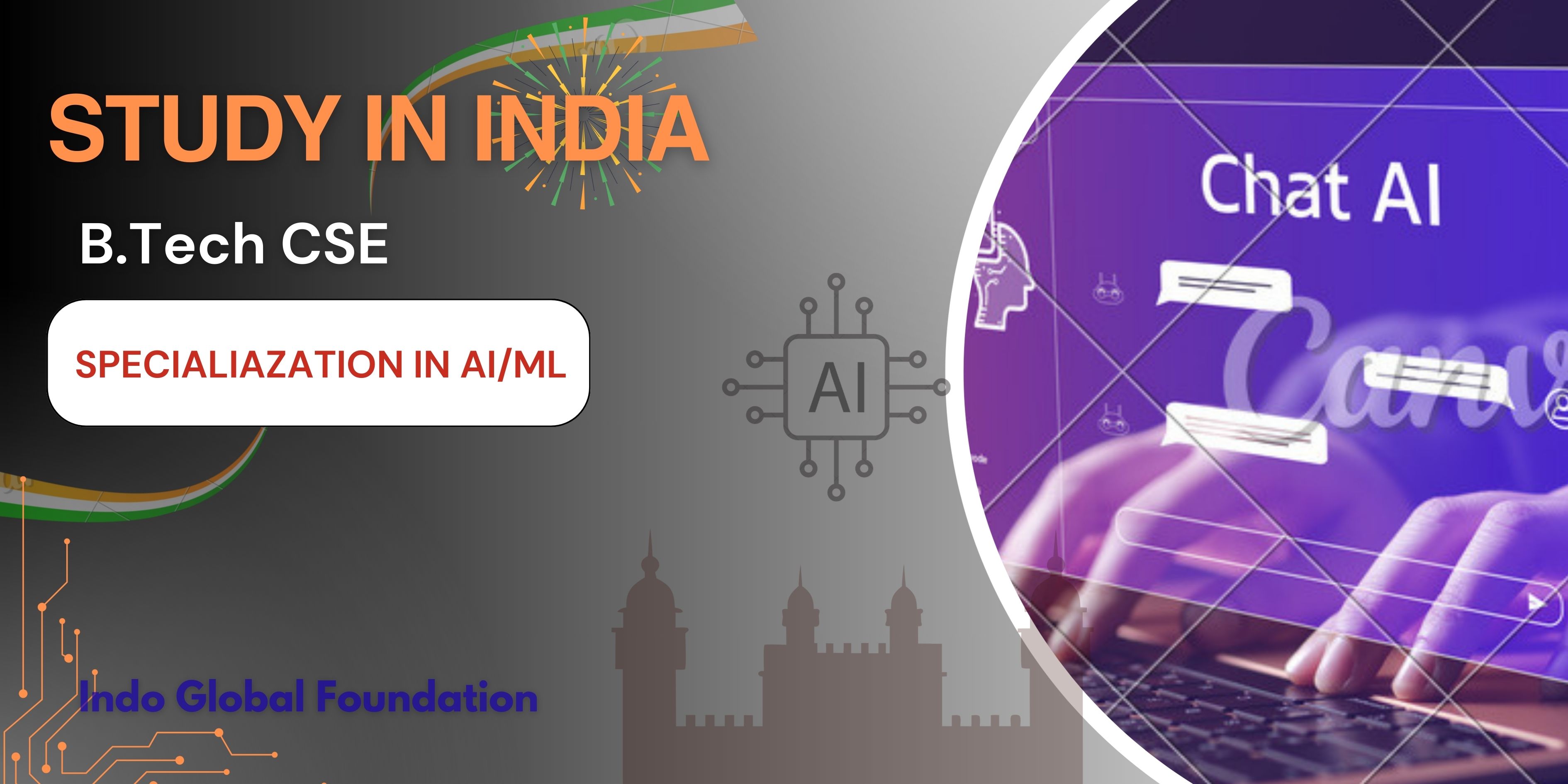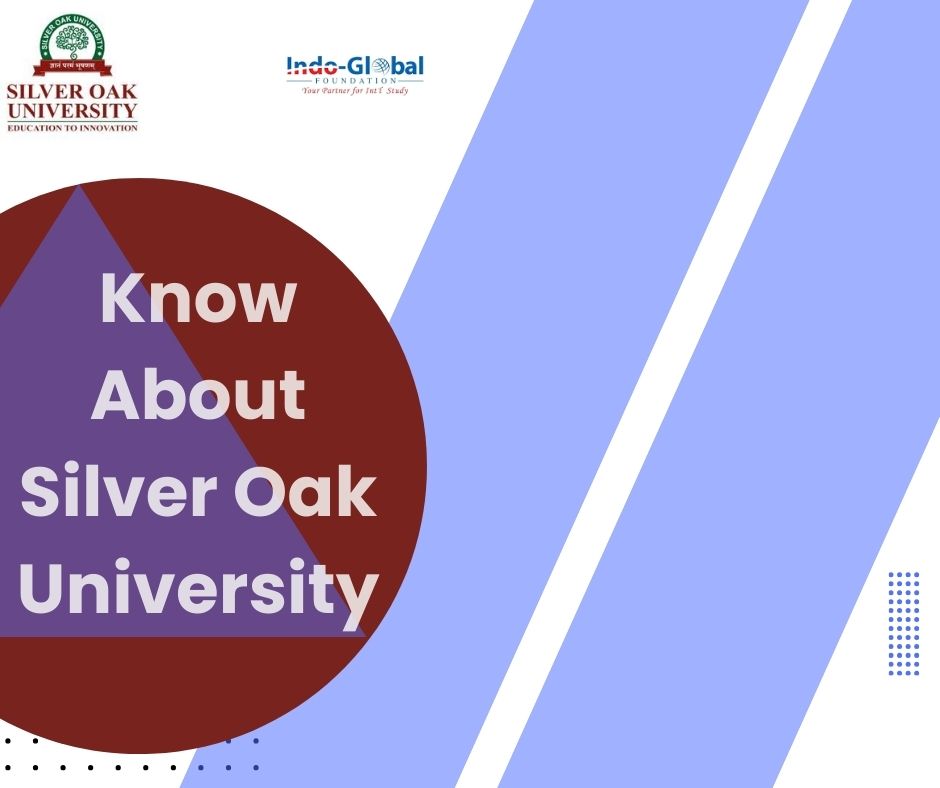Introduction
Artificial Intelligence (AI) and Machine Learning (ML) are transforming industries globally, and India is no exception. With the increasing demand for AI-powered solutions across healthcare, finance, e-commerce, robotics, and more, pursuing a B.Tech in Computer Science and Engineering (CSE) with specialization in AI & ML has become a top choice for students. For Nepali students, India offers a unique advantage with cultural familiarity, affordable education, and globally recognized universities. This guide provides everything you need to know – from eligibility and admission to scholarships, costs, career opportunities, and FAQs.

Why Choose B.Tech CSE in AI & ML?
- High-demand career: AI & ML professionals are among the most sought-after worldwide.
- Future-focused specialization: Prepares students for cutting-edge technologies.
- Global opportunities: Skills are transferable across industries and countries.
- Lucrative salaries: Top companies offer competitive pay.
- Innovation-driven learning: Encourages research, creativity, and problem-solving.
Why Study in India as a Nepali Student?
- No visa requirement: Thanks to the Indo-Nepal Treaty of Peace and Friendship, Nepali students don’t need a visa to study in India.
- Affordable education: Annual tuition typically ranges from ₹1.5 lakh (NITs) to ₹6 lakh (private institutions), which is significantly lower than Western countries.
- Cultural & linguistic familiarity: Easier adjustment compared to other countries.
- l High demand: India’s booming IT and AI industry opens direct pathways to jobs.
Course Duration
4 years (8 semesters)
Combination of core Computer Science subjects + AI/ML specialization modules
Eligibility Criteria
- Education: 10+2 with Physics, Chemistry, and Mathematics (PCM)
- Marks Required: 50–60% aggregate (varies by university)
- Entrance Exams: JEE Main, JEE Advanced, state-level CETs, DASA (for international/NRI), or direct university-specific exams
Admission Pathway
- IITs, NITs, IIITs → Through JEE Main & JEE Advanced (JoSAA counselling).
- DASA Scheme → Direct Admission of Students Abroad (SAT-based admission route for NITs, IIITs).
- Private Universities (e.g., VIT, SRM, Manipal) → Direct applications under the foreign/NRI category.
Application Process for Nepali Students
- Research and shortlist universities with AI & ML programs.
- Check eligibility and application deadlines (usually March–June).
- Prepare documents: +2 transcripts, SEE certificate, citizenship/passport, migration certificate, recommendation letters, SOP, passport-size photos.
- Apply via entrance exams, DASA portal, or directly on university websites.
- Confirm admission, receive offer letter, and complete enrollment.
Course Structure
Core Subjects
- Data Structures & Algorithms
- Computer Networks
- Database Management Systems
- Operating Systems
- Software Engineering
Specialization Subject
- Introduction to Artificial Intelligence
- Machine Learning Fundamentals
- Deep Learning & Neural Networks
- Natural Language Processing (NLP)
- Computer Vision
- Big Data Analytics
- Robotics & Intelligent Systems
Practical Learning
- Lab sessions & projects
- Industry internships
- Capstone projects
Top Colleges in India for B.Tech CSE (AI & ML)
- Indian Institutes of Technology (IITs) – select campuses
- National Institutes of Technology (NITs)
- Manav Rachna Educational Institutions
- Vellore Institute of Technology (VIT)
- SRM Institute of Science & Technology
- Amity University
- Christ University, Bangalore
Scholarships for Nepali Students
- ICCR Scholarships – covers tuition, accommodation, and stipend.
- SAARC Scholarships – tuition fee waivers in select universities.
- University Merit Scholarships – offered by private universities like VIT, SRM.
- Indian Government Scholarships:
- Golden Jubilee Scholarship (approx. NPR 4,000/month for undergraduates)
- ABVGSS (up to NPR 25,000/year based on merit)
- Silver Jubilee, Homi J. Bhabha, Nepal Aid Fund (varies by level)
There is complete guide for study in india scholarship . You can get detailed information
Cost of Living in India (Approx.)
- Tuition: ₹1.5–6 lakh per year (NPR 2.4–9.6 lakh)
- Accommodation: ₹10,000–20,000/month
- Food: ₹5,000–8,000/month
- Transport & Miscellaneous: ₹5,000–8,000/month
- Total Yearly Cost: Approx. NPR 4.2–8.5 lakh
- Note: Several universities offer generous scholarships to Nepali students, helping reduce overall expenses by more than 50%.
Career Opportunities
Job Roles:
- Machine Learning Engineer
- Data Scientist
- AI Engineer
- NLP Engineer
- Computer Vision Engineer
- Robotics Engineer
- Research Scientist
Top Recruiters:
- Google, Microsoft, Amazon, IBM
- Infosys, TCS, Wipro, HCL
- AI-driven startups & research labs
Salary Range:
- Freshers: ₹6–12 LPA
- Experienced: ₹20+ LPA
Higher Studies & Global Scope
- M.Tech in AI/ML or Data Science (via GATE)
- MS abroad in AI/ML or Data Science
- PhD & research opportunities
- MBA for management-oriented careers
FAQs for Nepali Students
Q1. Do Nepali students need a visa to study in India?
No, a visa is not required, but long-term students must register with FRRO after arrival.
Q2. What are the admission routes?
JEE (for IITs/NITs), DASA (SAT-based), or direct private university admissions.
Q3. What scholarships can I apply for?
ICCR, SAARC, merit scholarships, and Indian Government schemes like Golden Jubilee and ABVGSS.
Q4. How much does studying cost annually?
Approx. NPR 4.2–8.5 lakh, including tuition and living expenses.
Q5. When should I apply?
Applications usually open March–June. Scholarship deadlines vary, so apply early.
Q6. Is strong mathematics required?
Yes, mathematics (linear algebra, statistics, probability, calculus) is essential for AI/ML.
Q7. Is coding mandatory?
Yes, proficiency in Python, C++, Java, and R is crucial.
Summary Table

For Nepali students, India offers an accessible, affordable, and high-quality pathway to study B.Tech CSE with specialization in AI & ML. With world-class universities, ample scholarships, and no visa barriers, it’s one of the most promising options for building a global career in Artificial Intelligence and Machine Learning.



















